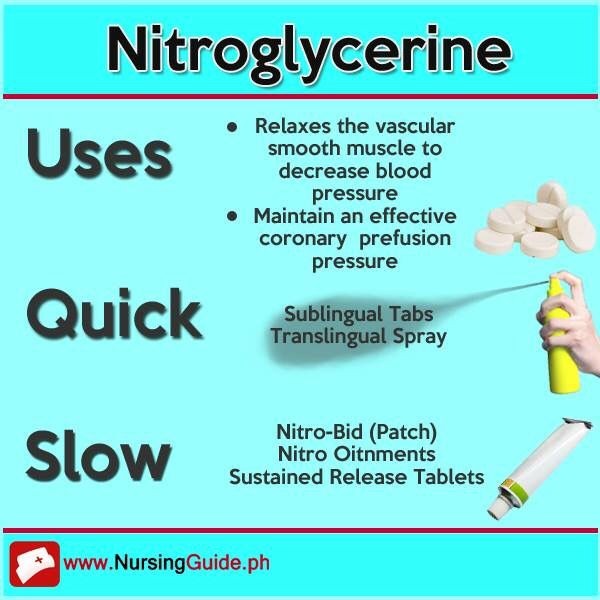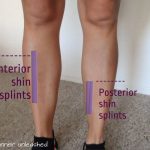
Contents
nitroglycerin IV
Nitroglycerin IV is used to treat chest pain (angina pectoris) in individuals with coronary artery disease who have not responded to sublingual nitroglycerin or beta blockers. It is also used for other cardiovascular conditions, including post-heart attack management and blood pressure control during and after surgical procedures. Nitroglycerin dilates peripheral arteries and veins, reducing blood pressure and improving blood flow to the heart and coronary arteries.
Nitroglycerin relaxes smooth muscles in veins and arteries, resulting in their dilation. This reduces venous return of blood to the heart, decreasing the workload on the heart. Arterial dilation, including in the coronary arteries, reduces systemic vascular resistance and arterial blood pressure. As a result, blood flow to the heart muscles improves, relieving associated chest pain.
Nitroglycerin is converted to nitric oxide in the body, which activates soluble guanylate cyclase (sGC). This enzyme converts guanosine triphosphate into cyclic guanosine monophosphate (cGMP), a signaling molecule that increases cGMP concentration in vascular smooth muscles and other tissues. This leads to relaxation of vascular smooth muscles, vasodilation, and a reduction in preload and afterload on the heart, ultimately reducing cardiac oxygen requirement.
Nitroglycerin IV is used for:
- Treating peri-operative hypertension
- Controlling congestive heart failure after a heart attack
- Inducing intra-operative hypotension
- Managing hypertensive crises
- Stopping variceal bleeding (when used with vasopressin)
- Addressing sympathomimetic drug-induced cardiopulmonary toxicities
- Managing congestive heart failure
Warnings
- Do not use nitroglycerin IV if you are hypersensitive to nitroglycerin or any of its components, including corn or corn products.
- Avoid nitroglycerin IV if you have conditions where cardiac output depends on venous return, such as pericardial tamponade, restrictive cardiomyopathy, constrictive pericarditis, hyperthyroidism, hypertrophic cardiomyopathy, postural hypotension, or severe kidney or liver function impairment.
IMAGES
Side effects of nitroglycerin IV
Common side effects of nitroglycerin IV include:
- Severe and recurrent headache
- Lightheadedness
- Low blood pressure (hypotension)
- Dizziness
- Weakness
- Rapid heart rate (tachycardia)
- Palpitations
- Unstable angina (crescendo angina)
- Rebound hypertension
- Fainting (syncope)
- Shortness of breath (dyspnea)
- Blurred vision
- Vertigo
- Nervousness
- Nausea
- Vomiting
- Dry mouth (xerostomia)
- Excessive sweating (diaphoresis)
- Flushing
- Methemoglobinemia (rare)
- Prolonged bleeding time
- Exfoliative dermatitis
- Low platelet count (thrombocytopenia)
If you experience any of the following symptoms or serious side effects, contact your doctor immediately:
- Fast or pounding heartbeats, fluttering in your chest, shortness of breath, and sudden dizziness (serious heart symptoms)
- Severe headache, confusion, slurred speech, severe weakness, vomiting, loss of coordination, feeling unsteady
- Severe nervous system reaction with very stiff muscles, high fever, sweating, confusion, fast or irregular heartbeats, tremors, and feeling like you might pass out
- Blurred vision, tunnel vision, eye pain or swelling, or seeing halos around lights (serious eye symptoms)
This is not an exhaustive list of side effects. Contact your doctor or report any side effects or health problems to the FDA at 1-800-FDA-1088.
Dosages of nitroglycerin IV
Infusion solution:
- 25 mg/250 mL
- 50 mg/250 mL
- 100 mg/250 mL
Injectable solution:
Adult:
Angina:
- If intolerant of or unresponsive to sublingual nitroglycerin (SL NTG)
- 5 mcg/minute
- Increase by 5 mcg/minute every 3-5 minutes up to 20 mcg/minute, then
- Increase by 10 mcg/minute
- May later increase by 20 mcg/minute
- Higher dosages required for PVC administration sets
- Uninterrupted infusion for longer than 24 hours produces tolerance
For Creatinine Clearance (CrCl) of 10-50 mL/minute, administer once every 24-72 hours. For CrCl below 10 mL/minute, administer once every 72-96 hours.
Other indications and uses:
- Angina pectoris
- Perioperative hypertension
- Congestive heart failure (CHF) in the setting of a myocardial infarction (MI)
- Induction of intra-operative hypotension
Off-label use:
- Hypertensive crisis
- Variceal bleeds (with vasopressin)
- Sympathomimetic-induced cardiopulmonary toxicities
Pediatric:
Congestive Heart Failure:
- Not FDA approved
- Initial dose: 0.25-0.5 mcg/kg/minute IV infusion, may increase by 0.5-1 mcg/kg/minute every 3-5 minutes as needed
- Usual range: 1-5 mcg/kg/minute IV infusion
- No more than 20 mcg/minute
Overdose
- Nitroglycerin IV overdose primarily causes excessive dilation of blood vessels, resulting in venous pooling, reduced arterial blood volume, blood pressure, and cardiac output.
- Symptoms include severe hypotension, palpitations, abnormal heart rhythms, fainting, heart block, slow pulse, rapid breathing followed by shortness of breath and reduced breathing, increased intracranial pressure, persistent headache, vertigo, nausea, vomiting, flushing, and perspiring, cold and clammy skin, visual disturbances, fever, confusion, paralysis, seizures, coma, and death.
- Nitroglycerin IV overdose can rarely cause clinically significant methemoglobinemia, especially in patients with genetic abnormalities of hemoglobin and predisposition for methemoglobinemia.
- There is no specific antidote for nitroglycerin overdose. Treatment involves increasing central fluid volume by having the patient lie down and stay warm, and passively elevating the legs to aid venous return. Intravenous fluids, oxygen, and assisted ventilation may be used if required. Intravenous methylene blue may be administered for methemoglobinemia.
Drug interactions with nitroglycerin IV
Inform your doctor of all medications you are currently taking to check for possible drug interactions. Do not start, stop, or change the dosage of any medication without your doctor’s recommendation.
- Severe interactions with nitroglycerin IV include: avanafil, bromocriptine, cabergoline, dihydroergotamine, dihydroergotamine intranasal, ergoloid mesylates, ergotamine, methylergonovine, riociguat, sildenafil, tadalafil, and vardenafil
- Other interactions with nitroglycerin IV include: cabergoline, ergoloid mesylates, ergotamine, lofexidine, and methylergonovine
- Other medications that may interact with nitroglycerin IV include: arginine, benazepril, bretylium, bupivacaine implant, dapsone topical, and tetracaine
- There are more possible interactions and adverse effects. Visit the RxList Drug Interaction Checker for more information.
- Make sure to inform your doctor, pharmacist, or healthcare provider of all prescription and over-the-counter medications you use, including the dosage for each.
Pregnancy and breastfeeding
- No animal reproductive studies have been conducted with nitroglycerin IV, but topical nitroglycerin ointment was not found to cause fetal harm.
- No adequate and well-controlled studies have been conducted in pregnant women. Only use nitroglycerin IV during pregnancy if clearly needed.
- Presence of nitroglycerin in breast milk is unknown. Use caution when nursing, as many drugs are excreted in breast milk.
By clicking "Submit," I agree to the MedicineNet Terms and Conditions and Privacy Policy. I also agree to receive emails from MedicineNet and understand that I may opt out of MedicineNet subscriptions at any time.
Summary
Nitroglycerin IV is used to treat chest pain (angina pectoris) associated with coronary artery disease in patients who have not responded to sublingual nitroglycerin or beta blockers. It is also used for other cardiovascular conditions, including post-heart attack management and blood pressure control during and after surgical procedures. Common side effects of nitroglycerin IV include severe and recurrent headache, lightheadedness, low blood pressure (hypotension), dizziness, weakness, rapid heart rate (tachycardia), palpitations, unstable angina (crescendo angina), rebound hypertension, fainting (syncope), shortness of breath (dyspnea), blurred vision, and vertigo.


